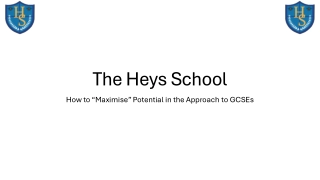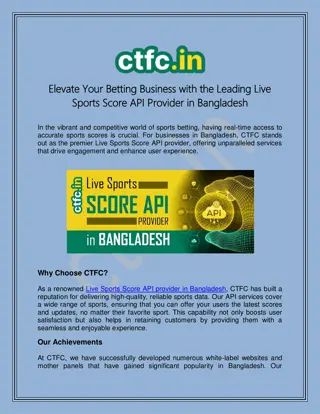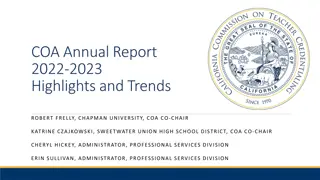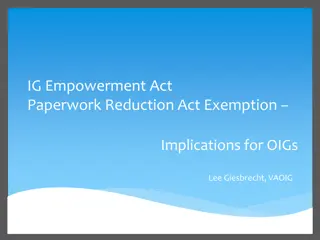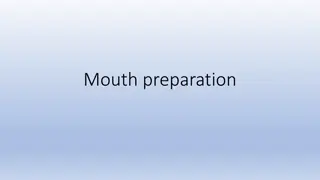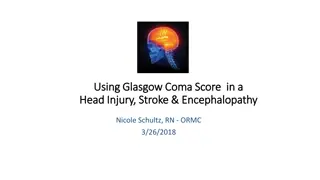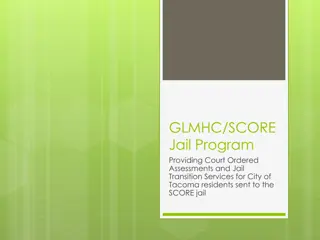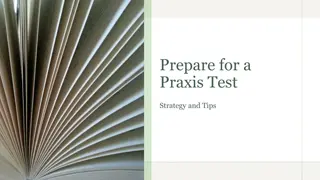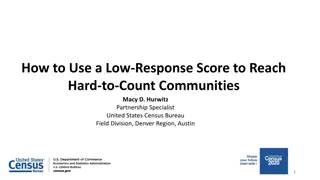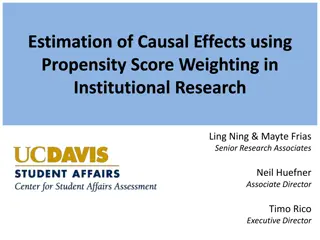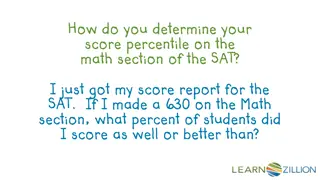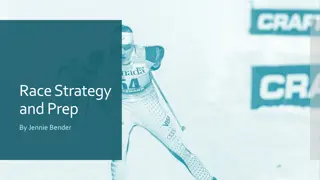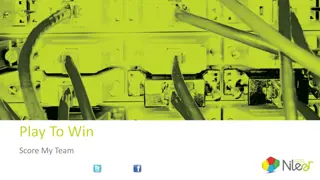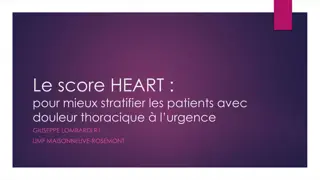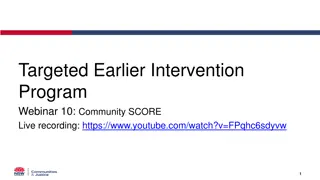Effective ACT Preparation Tips to Boost Your Score
Discover effective strategies and tips to improve your ACT score with insights on the test structure, sections, preparation tips for the night before and the test day, and general ACT tips. Learn how to prepare physically and mentally for the ACT to maximize your performance on test day.
Download Presentation

Please find below an Image/Link to download the presentation.
The content on the website is provided AS IS for your information and personal use only. It may not be sold, licensed, or shared on other websites without obtaining consent from the author.If you encounter any issues during the download, it is possible that the publisher has removed the file from their server.
You are allowed to download the files provided on this website for personal or commercial use, subject to the condition that they are used lawfully. All files are the property of their respective owners.
The content on the website is provided AS IS for your information and personal use only. It may not be sold, licensed, or shared on other websites without obtaining consent from the author.
E N D
Presentation Transcript
ACT PREP TIPS Strategies to help improve your ACT score By Michelle Evans
THE ACT TEST The test measures academic achievement It does NOT measure your intelligence or ability This means, you can increase your score by preparing for this test
What is the ACT test? A multiple choice standardized exam that measure your knowledge of some of the subjects taught in high school. 215 questions 3.5 hours with one break test is divided into 4 different tests (called sections) always given in the same order
The Four Sections English Test ( 45 minutes-75 questions) Math Test (60 minutes-60 questions) Break 10 to 15 minutes Reading Test (35 minutes-40 questions) Science and Reasoning Test (35 minutes- 40 questions) Optional Writing Test (30 minutes)
Getting Ready Friday Night: Eat a good meal rich in carbohydrates (such as pasta) at a reasonable hour. Be in bed by 11pm. Let your brain rest. No music, No Instagram, No Facebook Set two alarms or ask family and friends to ensure you wake up.
Prepare the Night Before and Bring the day of - Pencils Calculator*** Identification and Registration Wrist Watch*** Tissues (for winter test dates)
Saturday Morning: Wake up early, shower Wear comfortable and casual clothin Avoid being too comfortable. Avoid too tight. Dress in layers Eat a healthy, substantial breakfast. As a rule, protein is better than sugar. Avoid heavy foods (such as omelets) that could cause indigestion. Arrive by 7:35am so you don t feel rushed.
General ACT Tips Read directions before test date!! Pace Yourself (Announcements only made when 5 minutes) Read questions carefully (annotate) Write in Your Book Answer easy questions first Answer EVERY question (no penalty for guessing) Be precise in marking answer and don t make notes on answer sheet Don t panic! Work the entire time.
Triage Hospital term treat those patients with the most serious injury/illness first and the least sick/injured last. A term that can be applied to ACT HOW?
1. ACT Triage Strategy Each question on the ACT is worth one point. The most difficult question is worth the same point value as the easiest question Triage the ACT -find the easy questions to answer first and save the difficult questions for last This strategy allows your to make the best use of the allotted time
Now, Later, and NEVER Answer all questions that you are sure about first Answer those you are less sure about second Finally, save those that you have no idea about last-and GUESS!!! If you HAVE NO IDEA pick a specific letter and use that letter every time
Two Passes Do each section in two passes
First Pass The object is to answer every question you can answer. By answering every question of which you re sure, you will never have to hear the words pencils down and know there are several more questions that you could have done.
Second Pass Come back to those questions you skipped over in the first pass Ask yourself what questions do I want to do now? Obviously some of the questions will be easier than others, start with those. For questions that you have no idea how to answer, or even attempt to answer, guess.
Scoring More Points with ACT Triage Deciding whether you will do a question now, later, or never is a crucial part of improving your results on the ACT. Points of ACT triage - help you invest your time more profitability. By using the two- pass approach and the concept of triage, you will spend the majority of your time working on questions that seem easy or at least doable. In the end, you score more points!!
2. POE Strategy The Process of Elimination (POE for short) enables you to make your guesses really count. Incorrect answer choices are often easier to spot that correct ones. SO CROSS THEM OUT!
Practice What is the capital of Malawi? a. New York b. Lilongwe c. Paris d. Kinshasa 1.
3. Leave Nothing Blank Strategy For questions that you have no idea how to answer, or even attempt to answer, guess. Be a Smart Guesser USE POE Stay with one letter choice
ACT English Information ACT English Grammar 75 multiple choice questions; 45 minutes , 36 seconds per question Question given in conjunction with a passage Sentence Structure, Grammar and Usage, Punctuation, Rhetorical Skills The English section tests not only grammar rules but also punctuation errors as well ACT expects students to know what they want It s more than just pure grammar! In a series of 3 or more items, put a comma before the and Shorter sentences are preferred to longer sentences
Skim the entire passage first (roughly 1.5 minutes). Focus on grammar and revision skills, not comprehension. Answer diction and grammar questions first; they are usually the easiest to answer quickly. Listen for errors as you read the answer choices. You can often hear an error as you say a sentence in your head. Read ALL answers carefully; answers often look similar, sometimes differing only by a comma. NO CHANGE is the correct choice about 25% of the time.
ACT Math Information 60 multiple choice questions; 60 minutes 1 minute per question! Algebra I and II, Arithmetic, Geometry, Trigonometry This is 7th-11th grade math It s the wording in the question that makes this section difficult Only four Trig problems, but two can be done without having even learned Trig! They are out to intimidate you!
60 QUESTIONS/60 MINUTES (1 question per minute) Pre-Algebra/Elementary Algebra 24 Questions Intermediate Algebra/Coordinate Geometry 18 Questions Plane Geometry/Trigonometry 14 Questions 4 Questions
ACT Math Strategies Know how to estimate- this will improve your efficiency and score! Learn how to use a calculator graphing functions and matrix problems Be sure to eliminate the wrong answers Follow your personal order of difficulty start with your easiest section Read the question carefully they predict where students will misread the question you can count on that answer as being one of your choices they do this to trap students
Draw a picture if one is not provided. Figures given are not drawn to scale, so mark them with given measures or symbols. Know the following translations: of means multiply and permeans divide. Know the area and perimeter formulas for triangles, rectangles, and circles, and how to find the volume and surface area of a box. If a problem is given in terms of fractions, decimals, or percent, consider using an alternate form to find the answer.
If the question and/or answer set are given in terms of variables only, substitute simple numbers to help determine the answer. Most answers are listed from least to greatest, so you can use a technique called back solving to find the correct answer. Do not overuse your calculator! The test is written so that every problem can be solved without a calculator. Set up the problem in your test booklet first and take a moment to consider what a reasonable answer would be before using the calculator.
ACT Reading Information Reading 40 multiple choice questions; 35 minutes, less than 1 min to answer each question There are 4 types of passages you will encounter on the ACT. 1. Prose Fiction (10): Most interesting to read, but often the hardest questions! Most time-consuming! 2. Social Sciences (10): politics, history 3. Humanities (10): arts, culture 4. Natural Science (10): Typically the easiest!
ACT Reading Strategies Don t take the test in the order it s presented! Do the easiest section for you first, because you know you ll get those right. Save the hardest for last. Timing is everything! Pace yourself! Pay attention to distracters. Distracters are designed to distract your way of thinking, break your concentration, and throw you off track. Translate the question - What are they REALLY asking?
Read the passage actively (3 minutes); underline or circle any key points. Read with awareness of the author s goal, tone, and theme. If a question refers to a specific line of the passage, read one line above and below the indicated line to better understand the context. Save difficult questions (such as inferring) for last and answer easier questions (such as vocabulary) first. Note: It is best to finish one passage completely before going on to the next.
ACT Science Information Instead of calling it Science Reasoning, think of it as Technical Reading. Basic understanding of the scientific method will help you Not much science knowledge is needed Read and understand charts and graphs Opposites when a student encounters 2 answer choices that are direct opposites, one will almost always be the correct answer.
40 QUESTIONS/35 MINUTES (5 minutes per passage) Data Representation: 15 questions Research Summaries: 18 questions Conflicting Viewpoints: 7 questions
If a passage seems difficult, skip it; data representation passages are often the easiest. When reading passages, aim at a general understanding on the first reading and do not dwell on a specific aspect of data. If the passage contains conflicting viewpoints, consider similarities and differences between the scientists arguments. When reading tables and charts, focus on labels, trends in data, and maximum or minimum values. Look for connections between multiple data representations.
References act.org princetonreview.com



